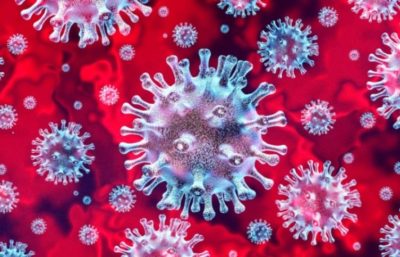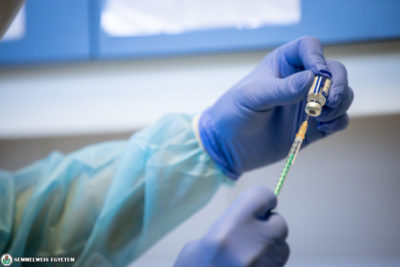The number of COVID-19 vaccine jabs administered by the medical staff of Semmelweis University is now over 10,000. As regards Semmelweis citizens, altogether 5,019 people (employees and medical students) have received the vaccine by now. The vaccination of the residents of retirement homes is also carried out by Semmelweis University. Information related to COVID-19 vaccine shots and the vaccination range of people involved in health care as it is based on the policy of the National Public Health Center, is being continuously updated and can be found on the coronavirus web page of the university.
At the university, COVID-19 vaccine jabs are given to employees of hospitals, health care providers (for example general practitioners, pediatricians, dentists and dental assistants) as it is ordered by the government, as well as to employees of the National Ambulance Service and the residents of retirement homes besides the vaccination of Semmelweis citizens based on the policy of the National Public Health Center. The current number of COVID-19 vaccine jabs can be followed in the heading section of the university’s web page since 6 January, 2021, which has exceeded the number 10,000 on 12 January.
By now, the medical staff of Semmelweis University have administered the COVID-19 vaccine jabs altogether to 11,481 people, out of whom 5,019 people are Semmelweis citizens: people involved in health care, medical health care personnel as well as 6th year medical students and medical students who voluntarily take part in the epidemiological control. In addition, COVID-19 vaccine jabs are also given to employees of hospitals, health care providers as it is ordered by the government, as well as to employees of the National Ambulance Service and the residents of retirement homes besides the vaccination of Semmelweis citizens based on the policy of the National Public Health Center.
The detection of COVID-19 antibodies
The detection of COVID-19 antibodies facilitates the decision whether an individual has already gone through the infection or not. However, it is important to know that COVID-19 antibodies are different and have an effect on different parts of the virus. Available commercial kits detect different COVID-19 antibodies in the blood, therefore the results provided by different kits may also be different. This especially has relevance in the case of Pfizer and Moderna vaccines. As a result of the COVID-19 vaccine jab, antibodies emerge against the Protein S of the virus. A considerable amount of tests, which have been in use in Hungary up to now, do not primarily detect antibodies against Protein S, therefore it may happen that antibodies cannot be detected from the blood in certain cases even after the person’s vaccination is administered. In order to reach this, such a reagent needs to be used, which can detect antibodies against Protein S.
As a short summary: earlier reagents are capable of detecting real COVID-19 infection. However, the efficiency of Pfizer and Moderna vaccinations has to be tested by new reagents instead, which can detect antibodies against Protein S.
Dr. Barna Vásárhelyi, Head of the Department of Laboratory Medicine and Dr. Béla Merkely, Rector
The administration of the second dose of the COVID-19 vaccine started this week at Semmelweis University for those who received the first shot at the institution on 26 December, 2020. Detailed information about the vaccination policy regarding Semmelweis citizens is available here.
Pálma Dobozi
Photo: Attila Kovács – Semmelweis University
Translation: Katalin Illés-Romhányi


